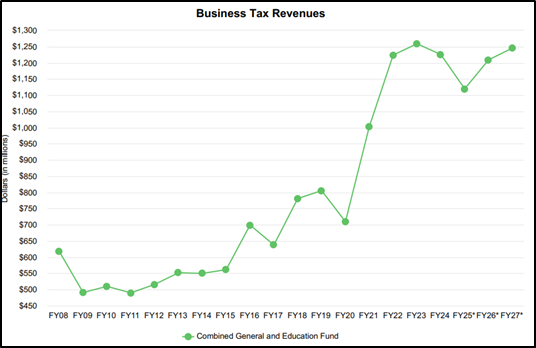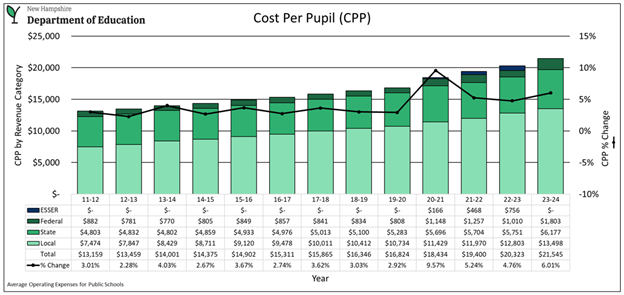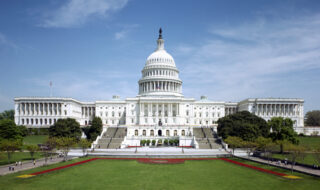April 14, 2025
NH House passed two-year, $15.4 billion budget
On April 10, the New Hampshire House of Representatives passed its version of the state budget for Fiscal Years 2026 and 2027. At roughly $15.4 billion, it comes in more than half a billion dollars below the levels recommended by Governor Ayotte back in February.
The budget comes in two parts:
– HB 1 establishes expected revenue levels and appropriates funds.
– HB 2 (the “budget trailer”) contains both budget-related policy and other priority initiatives for the majority.
Notably, Governor Ayotte’s proposal and the House-passed budget do not increase the state’s business taxes (Business Profits Tax, Business Enterprise Tax).
A key reason for the gap between the two proposals is the different expectations for near-term business tax revenues. After a massive spike coming out of the pandemic, business tax collections have dipped in the past couple of years.
Governor Ayotte expects a swift rebound in FY26-27:

Source: Governor’s Executive Budget Summary, 2026-27
However, House lawmakers projected BET and BPT revenues would come in about $300 million below the governor’s projections. Given the less rosy revenue estimates, House lawmakers made a number of cuts to agencies, boards, commissions, and vacant employment positions. Among the heftier cuts was a $50 million reduction to the University of New Hampshire system’s $1 billion budget.
Governor Ayotte and lawmakers are also out of sync on the state’s take from to-be-legalized slot machines that will replace some or all of the current historic horse racing-backed gaming terminals. House lawmakers have upped the state’s share from the current 25% to 30%, while the governor proposed 45%. The revenue would fund a variety of priorities, from education to pensions.
Other items that attracted significant debate in the budget included:
School Tax Cap Axed: In response to complaints about rising property taxes, the House budget initially included a limit on how much local school spending could increase from year to year.
Under the proposed cap, spending growth would have been limited to the five-year average of the Consumer Price Index-Northeast Region (less medical) until 2027; thereafter, growth would be capped according to a multiyear average of the change in the school district’s enrollment. School boards would have been permitted to override the cap with a 2/3 vote.
Despite local school funding representing the lion’s share of most property tax bills, local voters have not yet embraced locally-imposed school spending caps (which must be approved by 3/5 of a district’s voters) and school districts generally are not subject to the municipal spending growth restrictions adopted by some towns and cities.
New Hampshire schools spend an average of $21,545 per pupil, which compares to an average of a little less than $16,000 nationwide. In New Hampshire, 63% comes from local school taxes, 29% comes from the statewide education property tax, and 8% comes from the federal government.

The spending cap was removed via an amendment on a vote of 206 to 165, with one Independent and 38 Republicans joining with Democrats to kill it.
State Worker Defined Contribution Plan Scrapped: The budget trailer bill also included a shift to defined contribution retirement plan for state employees who start work on or after January 1, 2026. Under this plan, new employees would have directed their own investments and receive a fixed employer match from the state.
While the private sector has largely moved away from defined benefit pensions toward defined contribution retirement savings plans, state and local governments have been slow to follow suit for fear of upsetting (often) powerful and well-funded unions that represent public employees.
As Andrew Cline from the nonpartisan Josiah Bartlett Center explains, continuing to enroll new employees in the defined benefit pension system doesn’t benefit state workers or taxpayers. New Hampshire is already carrying a significant unfunded pension liability for existing employees and retirees, and returns on the state retirement system’s investments have underperformed the market in recent years.
Shifting new employees to defined contribution would have stopped the continued growth in liability, reduce future risk for taxpayers, and could offer better returns for state workers.
This provision was removed via floor amendment by a vote of 183 to 177.
State Tourism Budget: The House budget committees had suspended $14 million in funding for the state’s tourism office, but a bipartisan group of lawmakers voted to restore funding for FY26-27 on the floor.
—–
The state budget now moves on to the New Hampshire Senate, where lawmakers have until June 5 to come up with that body’s version. The Senate will have the benefit of more complete first quarter tax data – particularly BET and BPT revenue – as they decide appropriate levels of funding and reductions.
NFIB is a member-driven organization advocating on behalf of small and independent businesses nationwide.
Related Articles














